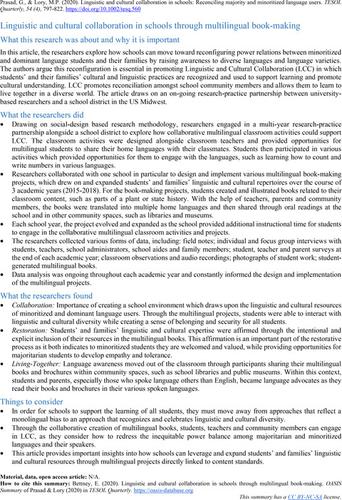Our official English website, www.x-mol.net, welcomes your feedback! (Note: you will need to create a separate account there.)
Linguistic and Cultural Collaboration in Schools: Reconciling Majority and Minoritized Language Users
Tesol Quarterly ( IF 3.410 ) Pub Date : 2019-12-31 , DOI: 10.1002/tesq.560 Gail Prasad 1 , Marie‐Paule Lory 2
Tesol Quarterly ( IF 3.410 ) Pub Date : 2019-12-31 , DOI: 10.1002/tesq.560 Gail Prasad 1 , Marie‐Paule Lory 2
Affiliation

|
This article extends the work of culturally sustaining pedagogy by moving towards the conceptualization of linguistic and cultural collaboration (LCC) in classrooms through reconciliation of majoritarian and minoritized language users. Whereas attention in mainstream educational research has been given to students’ cultures, this article underscores that explicit attention to diverse languages and language varieties is essential to reconfiguration of power relations in schools and reconciliation among culturally and linguistically minoritized and dominant groups. Drawing on scholarship regarding plurilingual and multilingual practice, the authors conceptualize LCC as both a process and a product that expands all students’ critical multilingual language awareness. They draw on an ongoing research‐practice partnership (RPP) with a U.S. school district experiencing growing cultural and linguistic diversity. The article focuses on a single school to illustrate how LCC has been taken up as a whole‐school approach to leveraging students’ and families’ cultural and linguistic resources as vital to learning and living together in a multicultural and multilingual world. After outlining development of the RPP following a social design–based methodology, the authors discuss how in practice reconciliation is forged as teachers, students, and their families engage in collaborative multilingual bookmaking. They focus on three aspects of reconciliation (collaboration, restoration, living together) that support students in becoming more language‐aware and in moving towards multilingual activism.
中文翻译:

学校的语言和文化合作:调和多数人和少数族裔语言使用者
本文通过调和多数派和少数派语言使用者的方式,走向教室中的语言和文化合作(LCC)概念化,从而扩展了文化维持教学法的工作。尽管主流教育研究已将注意力集中在学生的文化上,但本文强调指出,对多种语言和语言种类的明确关注对于重新配置学校中的权力关系以及在文化和语言上处于少数群体和优势群体之间的和解至关重要。作者利用有关多语言和多语言实践的奖学金,作者将LCC概念化为一种过程和一种产品,可以扩大所有学生对多语言的批判性意识。他们与美国建立了持续的研究实践合作伙伴关系(RPP)学区的文化和语言多样性不断增长。本文着重于一所学校,以说明LCC是如何作为一种整体方法来利用的,以利用学生和家庭的文化和语言资源对于在多元文化和多语言世界中学习和共同生活至关重要。在概述了基于社会设计方法的RPP的开发之后,作者讨论了在实践中如何在老师,学生及其家人参与多语言协作制作过程中实现和解。他们专注于和解的三个方面(合作,恢复,共同生活),这些方面支持学生提高语言意识并朝着使用多种语言的行动主义迈进。本文着重于一所学校,以说明LCC是如何作为一种整体方法来利用的,以利用学生和家庭的文化和语言资源对于在多元文化和多语言世界中学习和共同生活至关重要。在概述了基于社会设计方法的RPP的开发之后,作者讨论了在实践中如何在老师,学生及其家人参与多语言协作制作过程中实现和解。他们专注于和解的三个方面(合作,恢复,共同生活),这些方面支持学生提高语言意识并朝着使用多种语言的行动主义迈进。本文着重于一所学校,以说明LCC是如何作为一种整体方法来利用的,以利用学生和家庭的文化和语言资源对于在多元文化和多语言世界中学习和共同生活至关重要。在概述了基于社会设计方法的RPP的开发之后,作者讨论了在实践中如何在老师,学生及其家人参与多语言协作制作过程中实现和解。他们专注于和解的三个方面(合作,恢复,共同生活),这些方面支持学生提高语言意识并朝着使用多种语言的行动主义迈进。
更新日期:2019-12-31
中文翻译:

学校的语言和文化合作:调和多数人和少数族裔语言使用者
本文通过调和多数派和少数派语言使用者的方式,走向教室中的语言和文化合作(LCC)概念化,从而扩展了文化维持教学法的工作。尽管主流教育研究已将注意力集中在学生的文化上,但本文强调指出,对多种语言和语言种类的明确关注对于重新配置学校中的权力关系以及在文化和语言上处于少数群体和优势群体之间的和解至关重要。作者利用有关多语言和多语言实践的奖学金,作者将LCC概念化为一种过程和一种产品,可以扩大所有学生对多语言的批判性意识。他们与美国建立了持续的研究实践合作伙伴关系(RPP)学区的文化和语言多样性不断增长。本文着重于一所学校,以说明LCC是如何作为一种整体方法来利用的,以利用学生和家庭的文化和语言资源对于在多元文化和多语言世界中学习和共同生活至关重要。在概述了基于社会设计方法的RPP的开发之后,作者讨论了在实践中如何在老师,学生及其家人参与多语言协作制作过程中实现和解。他们专注于和解的三个方面(合作,恢复,共同生活),这些方面支持学生提高语言意识并朝着使用多种语言的行动主义迈进。本文着重于一所学校,以说明LCC是如何作为一种整体方法来利用的,以利用学生和家庭的文化和语言资源对于在多元文化和多语言世界中学习和共同生活至关重要。在概述了基于社会设计方法的RPP的开发之后,作者讨论了在实践中如何在老师,学生及其家人参与多语言协作制作过程中实现和解。他们专注于和解的三个方面(合作,恢复,共同生活),这些方面支持学生提高语言意识并朝着使用多种语言的行动主义迈进。本文着重于一所学校,以说明LCC是如何作为一种整体方法来利用的,以利用学生和家庭的文化和语言资源对于在多元文化和多语言世界中学习和共同生活至关重要。在概述了基于社会设计方法的RPP的开发之后,作者讨论了在实践中如何在老师,学生及其家人参与多语言协作制作过程中实现和解。他们专注于和解的三个方面(合作,恢复,共同生活),这些方面支持学生提高语言意识并朝着使用多种语言的行动主义迈进。


























 京公网安备 11010802027423号
京公网安备 11010802027423号